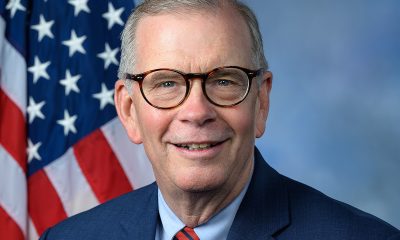News
In first, Senate confirms out fed’l appeals judge
Hughes confirmed unanimously to U.S. Court of Appeals for the Federal Circuit
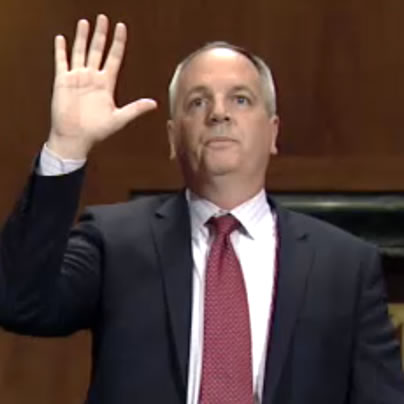
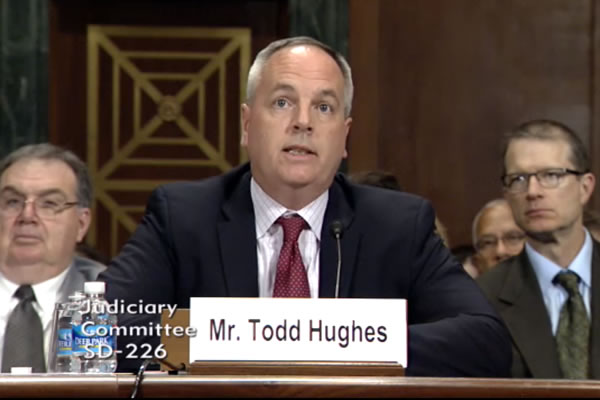
Todd Hughes is the first openly gay man confirmed to a federal appeals court (Screen shot via judiciary.senate.gov).
The U.S. Senate made history on Tuesday with little fanfare when it unanimously confirmed for the first-time ever an openly gay person to a federal appellate court.
By a vote of 98-0, the Senate confirmed Todd Hughes as a circuit judge for the U.S. Court of Appeals for the Federal Circuit, making him the highest-ranking openly gay judge.
In the half-hour of debate prior to his confirmation, senators focused on the budget and imminent government shutdown, although the significance of the Hughes confirmation did come up on the Senate floor.
Sen. Patrick Leahy (D-Vt.), chair of the Senate Judiciary Committee, said the confirmation of Hughes is “an important milestone.”
“If confirmed, Mr. Hughes would be the first openly gay judge to serve on a federal appellate court in our nation’s history,” Leahy said. “I’m proud the Senate has finally taken an historic step to break down another barrier and increase diversity in our federal bench.”
Conservatives like Charles Grassley (R-Iowa), Marco Rubio (R-Fla.), James Inhofe (R-Okla.), Mike Lee (R-Utah) and Lindsey Graham (R-S.C.) joined Democrats like Debbie Stabenow (D-Mich.), Jeff Merkley (D-Ore.) and Barbara Mikulski (D-Md.) in voting for the nominee.
The U.S. Court of Appeals for the Federal Circuit is located in D.C. and has jurisdiction over issues such as federal claims, veterans claims and patent issues.
Under President Obama, the Senate has confirmed seven openly gay judicial nominees, but never before — either under Obama or under a previous administration — has the Senate confirmed an openly gay person to an appellate-level court.
During his confirmation hearing on June 19, Hughes identified “fidelity to the law” as a quality a federal judge should have.
“The first and foremost quality a federal judge should have is fidelity to the law,” Hughes said. “He should be fair to all the litigants. He should be thoroughly prepared, understand the facts of the case, the law and come to a reasoned and equitable decision.”
Hughes has most recently served since 2007 as deputy director for the Commercial Litigation Branch of the Civil Division at the Justice Department. Prior to that, he worked for the Commercial Litigation Branch as a trial attorney.
Obama nominated Hughes for the seat on the appeals court in February and the Senate Judiciary Committee reported out his nomination to the Senate floor in July.
Hughes’ practice has been related to federal personnel law, veterans’ benefits, international trade, government contracts and jurisdictional issues regarding the U.S. Court of Federal Claims.
Advocates welcomed the news of Hughes’ confirmation and called it a milestone for the LGBT community.
Michael Cole-Schwartz, a spokesperson for the Human Rights Campaign, said Hughes’ confirmation is significant both in terms of the barrier it breaks and the judge’s record.
“Judge Hughes is an eminently qualified nominee who also happens to shatter a barrier as the first openly gay federal appellate court judge,” Cole-Schwartz said. “It’s a testament to how far we have come as a country that his sexual orientation is irrelevant to his ability to serve on our nation’s courts.”
D’Arcy Kemnitz, executive director of the LGBT Bar Association, said the confirmation is “an important milestone for the LGBT legal profession.”
“It also shows that Congress, and the country, want the best person for the job, regardless of sexual orientation,” Kemnitz said. “Our federal judiciary is a better one when it reflects the diversity of the nation it serves. We commend President Obama for his nomination of Hughes, and the Senate for confirming that nomination.”
The American Bar Association’s Standing Committee on the Federal Judiciary gave Hughes a rating of “unanimously well qualified” during his confirmation process.
Obama made an attempt before to seat an openly gay person to a federal appeals court, but it didn’t succeed. In 2010, Obama nominated Edward Dumont to the U.S. Court of Appeals for the Federal Circuit, but that nomination was rescinded after no action was taken on the appointment for 18 months and DuMont requested his name be withdrawn.
Now that the Senate has confirmed Hughes, a total of 50 judicial nominees nominated by Obama remain pending before the Senate awaiting action. Thirteen are pending on the Senate floor and 37 are pending in committee.
Among the 37 is William Thomas, whom Obama first nominated for a seat on the U.S. District Court for the Southern District of Florida nearly a year ago in November. If confirmed, Thomas would be the first openly gay black person to sit on the federal bench.
Sen. Marco Rubio (R-Fla.), who had previously supported the Thomas confirmation, has been holding up the proceedings for the nominee by refusing to return a “blue slip” to the Senate Judiciary Committee.
The Washington Blade has previously reported that Rubio was holding up the confirmation process for Thomas by refusing to turn in the “blue slip” for the nominee.
Brooke Sammon, a Rubio spokesperson, told the Blade and other media outlets this week Thomas’s record as a judge on state court “raises serious concerns about his fitness” for a lifetime federal appointment.
“Those concerns include questions about his judicial temperament and his willingness to impose appropriate criminal sentences, particularly in the two high-profile cases of Michele Traverso and Joel Lebron earlier this year,” Sammon said. “After reviewing Thomas’s record, Senator Rubio cannot support moving forward with the nomination at this time.”
With respect to the Traverso case, Nushin Sayfie, administrative judge for the criminal division of the Eleventh Judicial Circuit in Florida, wrote a letter to Rubio over the summer saying the sentence Thomas gave was within his guideline range, as the Washington Blade previously reported.
The White House didn’t respond to a request to comment on whether Obama would rescind his nomination of Thomas over Rubio’s objections.
Other openly gay nominees pending before the Senate are James “Wally” Brewster, Jr., who was nominated as U.S. ambassador to the Dominican Republic, and Chai Feldblum, who was nominated for a second term for a seat on the U.S. Equal Employment Opportunity Commission.
District of Columbia
LGBTQ budget advocates fight for D.C. resources in a tough fiscal year
‘Trying to preserve life-saving services’ amid $1 billion cut

The months and days leading up to June are especially busy for LGBTQ Washingtonians. For one group, the DC LGBT Budget Coalition, which works year-round to ensure LGBTQ residents are represented and financially supported by the D.C. government, this time of year is their Super Bowl. Beginning in April, the D.C. Council and Mayor’s Office hold budget hearings for the next fiscal year.
With D.C.’s budget now under review, the Washington Blade spoke with Heidi Ellis, coordinator of the DC LGBT Budget Coalition, about the group’s top priorities and their push to ensure continued support for queer communities.
“The LGBTQ Budget Coalition was founded in 2020 at the height of the pandemic, as a way for the community to work together to advocate for key funding and policy changes,” Ellis said. “We recognized we were stronger together. A lot of groups are often pitted against each other for resources and dollars. This coalition was founded out of a need for unity. Since then, we’ve successfully advocated for more than $20 million in dedicated LGBTQ investments.”
In addition to coordinating the coalition, Ellis is the founder and CEO of HME Consulting & Advocacy, a firm that helps build coalitions and advance policy initiatives that address intersectional issues in the LGBTQ community. One of its most powerful tools, she explained, is direct outreach through community surveys.
“We actually do community surveys to see what people need and what’s top of mind,” Ellis said. “Of course, we also pay attention to the broader political landscape — like the current threats to HIV funding. That helps us prioritize.”
Because the coalition is comprised of more than 20 organizations across various sectors —healthcare, housing, community organizing — Ellis said its diversity enables it to connect grassroots needs to potential policy solutions.
“Our coalition includes service providers, community groups, health and housing advocates-folks who are deeply plugged into what’s happening on the ground,” she said. “They help determine our direction. We know we don’t represent every queer person in D.C., but our coalition reflects a wide range of identities and experiences.”
The insights gathered through those surveys ultimately inform the coalition’s annual budget proposal, which is submitted to the Council and mayor.
“That’s how we got to our FY26 priorities,” she said. “This year, more than ever, we’re fighting to protect what we’ve already secured — funding and policies we’ve had to fight for in the past. We know there’s concern around this budget.”
One of the challenges this year is that the D.C. government’s operating budget and some of its legislation must be approved by Congress. With a projected decline in tax revenue and a Republican-controlled Congress that has historically opposed LGBTQ funding, the Coalition has had to think strategically.
“Even before the situation on the Hill, the CFO projected lower revenue,” Ellis said. “That meant cuts to social programs were already coming. And now, with the $1 billion slashed from D.C.’s budget due to the continuing resolution, we’re not only fighting for D.C.’s budget and autonomy, but also trying to preserve life-saving services. Our message is simple: Don’t forget about queer people.”
This year’s proposal doesn’t include specific dollar figures. Instead, the Coalition outlines five funding priority areas: Healthcare, Employment & Economic Equity, Housing, Safety & Community Support, and Civil Rights.
Why no exact amounts? Ellis said it’s because not all solutions are financial.
“Some of our asks don’t require new funding. Others build on existing programs-we’re asking whether the current use of funds is the most effective. We’re also proposing policy changes that wouldn’t cost extra but could make a real difference. It’s about using what we have better,” she said.
When drafting the proposal, the Coalition tries to prioritize those with the most pressing and intersecting needs.
“Our perspective is: If we advocate for the most vulnerable, others benefit too,” Ellis said. “Take LGBTQ seniors. Some may have done well in life but now face housing insecurity or struggle to access affordable healthcare. Many in our coalition are elders who fought on the frontlines during the AIDS epidemic. They bring critical historical context and remind us that Black and brown communities bore the brunt of that crisis.”
“I love our coalition because it keeps us accountable to the moment,” she added. “If we center those most marginalized, we can make an impact that lifts everyone.”
In addition to healthcare and housing, safety remains a top concern. The Coalition has fought to maintain funding for the Violence Prevention and Response Team (VPART), a city-supported group that includes MPD, community-based organizations, and the Mayor’s Office of LGBTQ Affairs. VPART responds to crimes affecting the LGBTQ community and connects victims to legal, healthcare, and housing services.
“We’ve pushed to make VPART more proactive, not just reactive,” Ellis said. “The funding we’ve secured has helped survivors get the support they need. Cutting that funding now would undo progress we’re just beginning to see.”
At the end of the day, Ellis emphasized that this process is about far more than spreadsheets.
“A budget is a moral document,” she said. “If we’re not represented, you’re telling us our lives don’t matter at a time when we need protection the most. When people can’t get food, medicine, housing — that has a devastating impact. These are vital services.”
The DC LGBT Budget Coalition is urging residents to support a letter-writing campaign to D.C. Council members and the mayor. You can send a letter here: https://actionnetwork.org/letters/fully-fund-dcs-lgbtq-communities
Read the full FY26 budget proposal here: https://drive.google.com/file/d/1bTrENnc4ZazJTO6LPrQ3lZkF02QNIIf1/view
Arts & Entertainment
Washington Blade’s Pride on the Pier returns bigger than ever with two-day WorldPride celebration
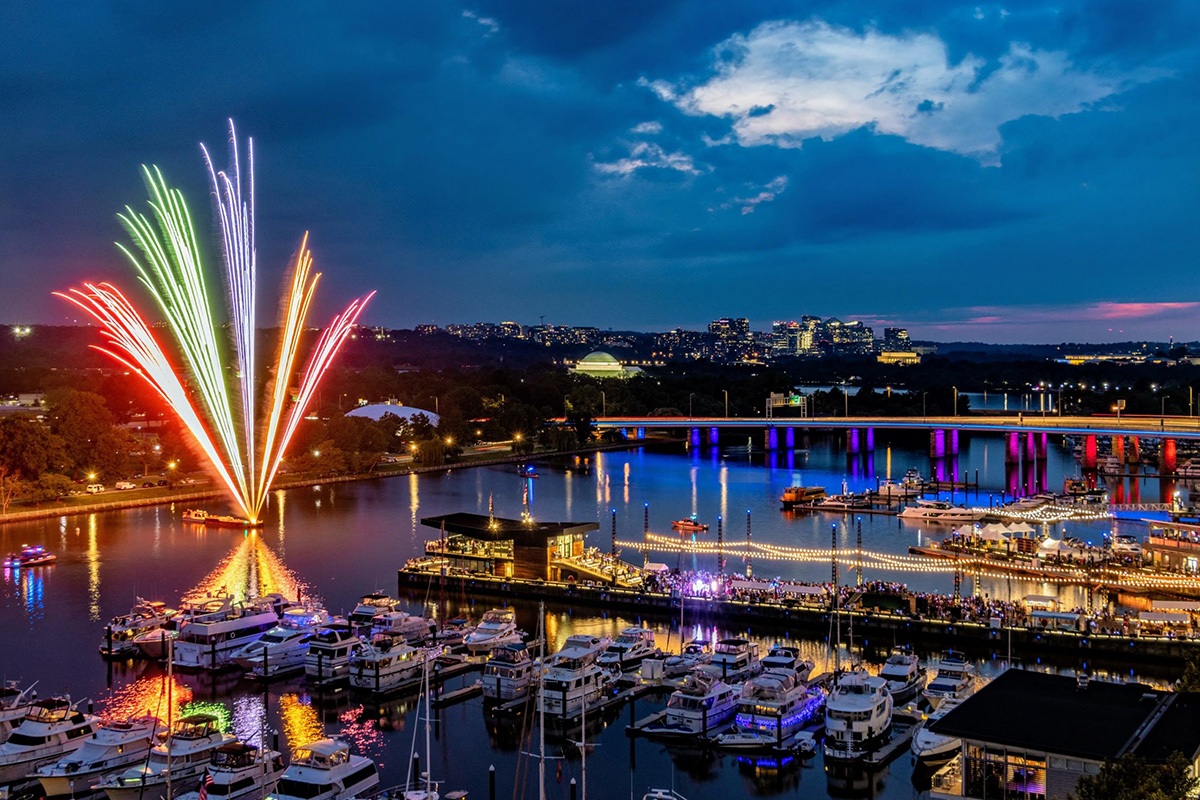
The Washington Blade’s Pride on the Pier will be extended to a two-day celebration in honor of WorldPride coming to D.C. this year. Taking place on Friday, June 6 and Saturday, June 7 at The Wharf, this year’s event promises more entertainment, more community, and more pride than ever before — all set against the stunning waterfront backdrop of our nation’s capital.
With the addition of Friday, the party kicks off at 3 p.m., with the inaugural WorldPride Boat Parade at 7 p.m. As an Official WorldPride Partner event, the boat parade will feature 30 decorated boats parading along the Washington Channel. For information on signing up for the boat parade contact Stephen Rutgers at [email protected].
Saturday’s signature Pier Party kicks off at 12 p.m., featuring a drag show, DJ’s, streaming of the WorldPride Parade, and the iconic Fireworks Show Presented by the Leonard-Litz Foundation — one of D.C. Pride’s most anticipated spectacles.
“We’re expanding Washington Blade Pride on the Pier to reflect the excitement and momentum building for WorldPride in D.C.,” said Blade publisher Lynne Brown. “It’s a celebration of our community’s progress and a powerful reminder of the joy and visibility Pride brings to the heart of our city.”
Now in its seventh year, Washington Blade Pride on the Pier extends the city’s annual celebration of LGBTQ visibility to the bustling Wharf waterfront with an exciting array of activities and entertainment for all ages. The District Pier will offer DJs, dancing, drag, and other entertainment. Alcoholic beverages will be available for purchase for those 21 and older.
Pride on the Pier is free and open to the public, with VIP tickets available for exclusive pier access, hosted bars, and private viewing areas for the boat parade and the fireworks show. To purchase VIP tickets visit www.prideonthepierdc.com/vip.
Friday VIP: 5-9 p.m., enjoy an air-conditioned lounge, private bathroom, cash bar and complimentary drink.
Saturday VIP Session #1: 2-5 p.m., enjoy an air-conditioned lounge, private bathroom, catered food, and an open bar.
Saturday VIP Session #2: 6-9 p.m., enjoy the air-conditioned lounge, private bathroom, catered snacks and dinner, and open bar with a front-row view of the fireworks.
Event Details:
📍 Location: District Pier at The Wharf (101 District Sq., S.W., Washington, D.C.)
📅 Dates: Friday, June 6 & Saturday, June 7, 2025
🛥️Boat Parade: 7 p.m. (June 6). 🎆 Fireworks Show: 9 p.m. (June 7)
🎟️ VIP Tickets: www.PrideOnThePierDC.com/VIP
Event sponsors include Absolut, Capital Pride, DC Fray, Infinate Legacy, Heineken, Leonard-Litz Foundation, Mayor’s Office of LGBTQ Affairs, Relish Catering, Washingtonian, and The Wharf. More information regarding activities will be released at www.PrideOnThePierDC.com
Maryland
Md. schools plan to comply with federal DEI demands
Superintendents opt for cooperation over confrontation
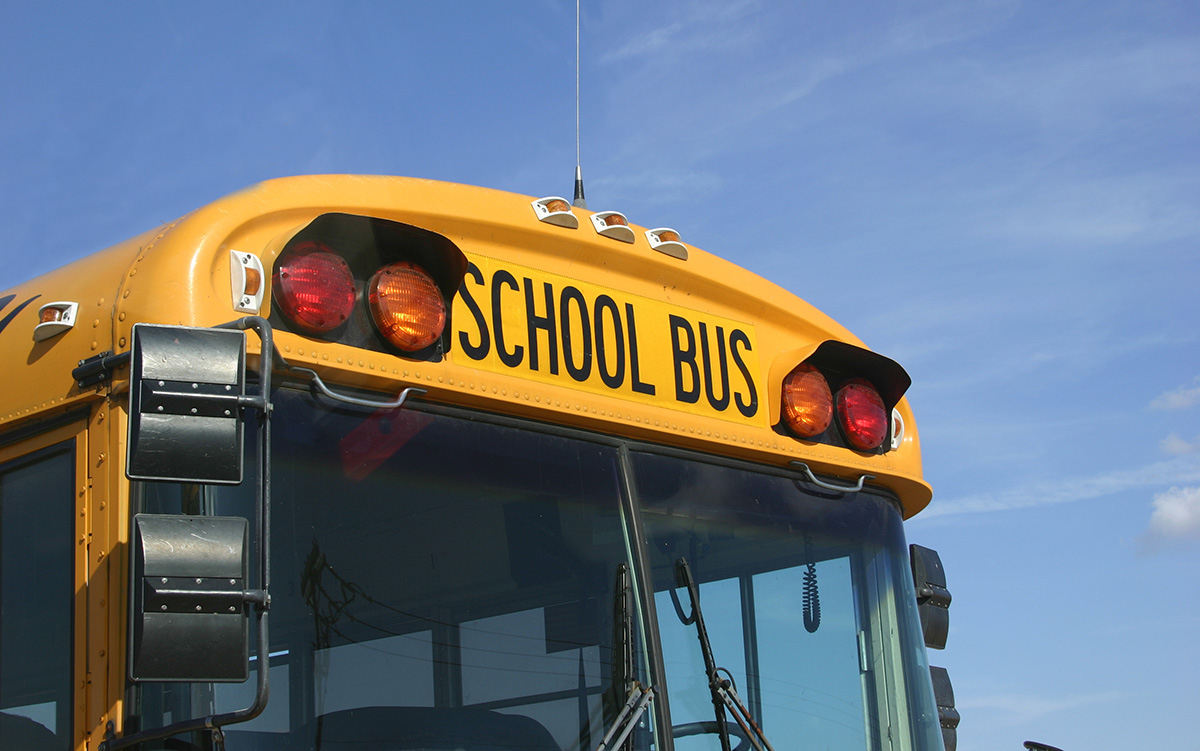
By LIZ BOWIE | Deciding not to pick a fight with the Trump administration, Maryland school leaders plan to sign a letter to the U.S. Department of Education that says their school districts are complying with all civil rights laws.
The two-paragraph letter could deflect a confrontation over whether the state’s public schools run diversity, equity, and inclusion programs that the Trump administration has called illegal. The Baltimore Banner reviewed the letter, which was shared by a school administrator who declined to be identified because the letter has not yet been sent.
Maryland school leaders are taking a more conciliatory approach than those in some other states. Education leaders in Minnesota, New York, Colorado, Oregon, Vermont, and Wisconsin said they will not comply with the federal education department’s order, the demands of which, they say, are based on a warped interpretation of civil rights law.
The rest of this article can be found on the Baltimore Banner’s website.
-

 Opinions5 days ago
Opinions5 days agoIt’s time for new leadership on the Maryland LGBTQIA+ Commission
-

 The White House5 days ago
The White House5 days agoWhite House does not ‘respond’ to reporters’ requests with pronouns included
-

 Arts & Entertainment5 days ago
Arts & Entertainment5 days ago‘Gay is Good’ Pride Pils Can Celebrates Frank Kameny’s 100th Birthday for WorldPride in D.C.
-

 Sponsored5 days ago
Sponsored5 days agoTHC Drinks: What You Should Know About Cannabis Beverages

